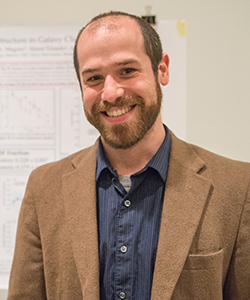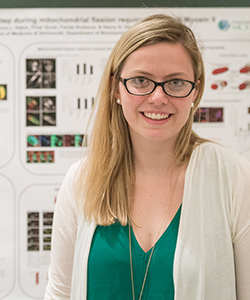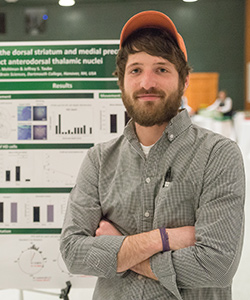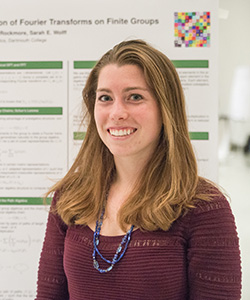More than 40 graduate students presented their research—with topics ranging from understanding obesity to mapping HIV antibodies to measuring nanoparticles—to faculty members, their peers, and others in the Dartmouth community during the April 8 Graduate Poster Session. The event was one of the highlights of Graduate Student Appreciation Week, held April 8 through 11.
Awards were presented to the following graduate students for their posters:
Seth Cohen received an award for his poster, “Star Formation and Substructure in Galaxy Clusters.” (Photo by Eli Burakian ’00)
Seth Cohen, Physics and Astronomy
Hometown: Columbia, Md.
Poster Title: Star Formation and Substructure in Galaxy Clusters
Research: “I study how stars form in galaxy clusters, the largest structures in the universe and home to the most energetic events since the Big Bang. To do this, I use observational data from both ground- and space-based telescopes to analyze thousands of galaxies at once.”
Why Dartmouth: “Dartmouth’s astronomy department is ideal for me: small, but with excellent professors and research programs. This combined with the unlimited mountain activities in the area made Dartmouth an obvious choice for me.”
Anna Hatch received an award for her poster, “Actin-Dependent Mitochondrial Fission Mediated by Drp1, the Formin INF2, and Myosin II.” (Photo by Eli Burakian ’00)
Anna Hatch, Molecular and Cellular Biology (MCB) Program (Biochemistry)
Hometown: Hibbing, Minn.
Poster Title: Actin-Dependent Mitochondrial Fission Mediated by Drp1, the Formin INF2, and Myosin II
Research: “Just as cars require a regular tune-up and oil change for optimal performance, cells in our body have multiple mechanisms to maintain molecular machinery. The mitochondrion is one cellular structure that requires routine maintenance. To do this, the mitochondrion undergoes a process called fission, where it divides into two parts. I am using biochemistry to better understand how the actin cytoskeleton promotes mitochondrial fission in mammalian cells.”
Why Dartmouth: “The MCB faculty make scientific training a priority. I feel well equipped to organize experiments and communicate my results.”
Max Mehlman received an award for his poster, “Head Direction Cell Activity in the Dorsal Striatum and Medial Precentral Cortex Requires Intact Anterodorsal Thalamic Nuclei.” (Photo by Eli Burakian ’00)
Max Mehlman, Psychological and Brain Sciences
Hometown: Bethlehem, N.Y.
Poster Title: Head Direction Cell Activity in the Dorsal Striatum and Medial Precentral Cortex Requires Intact Anterodorsal Thalamic Nuclei
Research: “My lab examines how the brain processes sensory input to form a sense of direction, which animals require to efficiently navigate within their environments and obtain vital resources. We study rodent head direction cells, specialized neurons that activate only when the animal is facing a specific direction, thus functioning much like a compass.”
Why Dartmouth: “For me, Dartmouth is the complete package. I work in a fantastic lab studying a topic I have been fascinated by since I was an undergraduate. Outside of lab, I have enjoyed many opportunities to teach and mentor a wide range of students, another passion of mine. Pair these wonderful academic experiences with getting to live in the beautiful Upper Valley, and I could not be happier.”
Sarah Wolff received an award for her poster, “Separation of Variables and the Computation of Fourier Transforms on Finite Groups.” (Photo by Eli Burakian ’00)
Sarah Wolff, Mathematics
Hometown: Arlington, Va.
Poster Title: Separation of Variables and the Computation of Fourier Transforms on Finite Groups
Research: “My work is motivated by techniques used in digital signal processing. Digital signal processing techniques allow us to manipulate signals, such as audio or radio, in order to better analyze them. A Fourier transform allows us to convert a signal from one domain to another (time domain to frequency domain) so that it is simpler to apply mathematical tools to analyze the signal. I study generalizations of Fourier transforms and methods to efficiently compute them.”
Why Dartmouth: “I am very passionate about teaching, and the Dartmouth math PhD program is committed to training excellent teachers by providing a summer teaching seminar as well as many teaching opportunities.”
Elizabeth Molina-Markham, web content editor for The Graduate Forum, contributed to this story.



